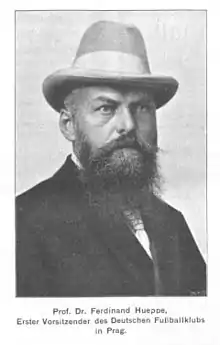Ferdinand Hueppe
Ferdinand Adolph Theophil Hueppe (24 August 1852 – 15 September 1938) was a German physician, bacteriologist and hygienist. From 1900 to 1904, he was the first Deutscher Fußball-Bund (DFB, German Football Association) president.
Ferdinand Hueppe | |
|---|---|
 Hueppe in 1902 | |
| 1st President of the DFB | |
| In office 7 October 1900 – 1904 | |
| Preceded by | Office established |
| Succeeded by | Friedrich Wilhelm Nohe |
| Personal details | |
| Born | Ferdinand Adolph Theophil Hueppe 24 August 1852 Neuwied-Heddesdorf, Kingdom of Prussia |
| Died | 15 September 1938 (aged 86) Dresden, Nazi Germany |
| Alma mater | University of Berlin |
Biography
From 1872 to 1876, Hueppe studied medicine at the University of Berlin, afterwards serving as a military surgeon. From 1880 to 1884 he was a member of bacteriologist Robert Koch's staff in Berlin, and later worked at Carl Remigius Fresenius' institute (the Chemischen Institut Fresenius) in Wiesbaden. From 1889 to 1912 he was a professor at Charles University in Prague.
Hueppe is remembered for his pioneer investigations of hormesis in regards to chemical stimulation/inhibition of bacterial growth. The eponymous "Hueppe’s rule" is an historical term synonymous with hormesis.
Hueppe promoted a völkisch type of racial hygiene in which Aryans and Jews were considered separate races. He advocated Arnold Rikli's light and air baths as well as physical exercise.[1]
Criticism of vegetarianism
Hueppe opposed vegetarianism and characterized German vegetarians as "feminized men" who degenerated the Aryan race.[1] He argued that "Powerful Aryan elites" risked degeneration if they turned away from the omnivorous diet that had made their bodies and nation strong.[1] Hueppe stated that the earliest humans were meat eaters and that modern humans survive best on an omnivorous diet because a vegetarian diet is excessive in carbohydrates and lacks in protein. He described vegetarians as the "victims of an unnatural mode of existence".[2][3]
Publications
His book on bacterial research, Die methoden der bakterien-forschung, was later translated into English and published in 1886 with the title "The methods of bacteriological investigation".[4] Other noted efforts by Hueppe include:
- Naturwissenschaftliche Einführung in der Bakteriologie, 1896 – Natural sciences introduction to bacteriology.
- Der moderne Vegetarianismus 1900 – Modern vegetarianism.
- Hygiene der Körperübungen, 1922 – Hygiene associated with physical exercise.[5]
References
- Parts of this article are based on a translation of an article from the German Wikipedia.
- International Dose-Response Society, Biography
- Treitel, Corinna. (2017). Eating Nature in Modern Germany: Food, Agriculture and Environment, c.1870 to 2000. Cambridge University Press. pp. 92–93. ISBN 978-1-107-18802-0
- "Vegetarianism". The British Medical Journal. 1 (2096): 535. 1901.
- "Vegetarianism and Evolution". The Sanitarian. 47 (382): 265–266. 1901.
- Google Books The collected works of Sir Humphry Davy ...: Discourses delivered before the .by John Merle Coulter, Sir Humphry Davy, M.S. Coulter, Charles Reid Barnes, Joseph Charles Arthur
- Google Search (publications)